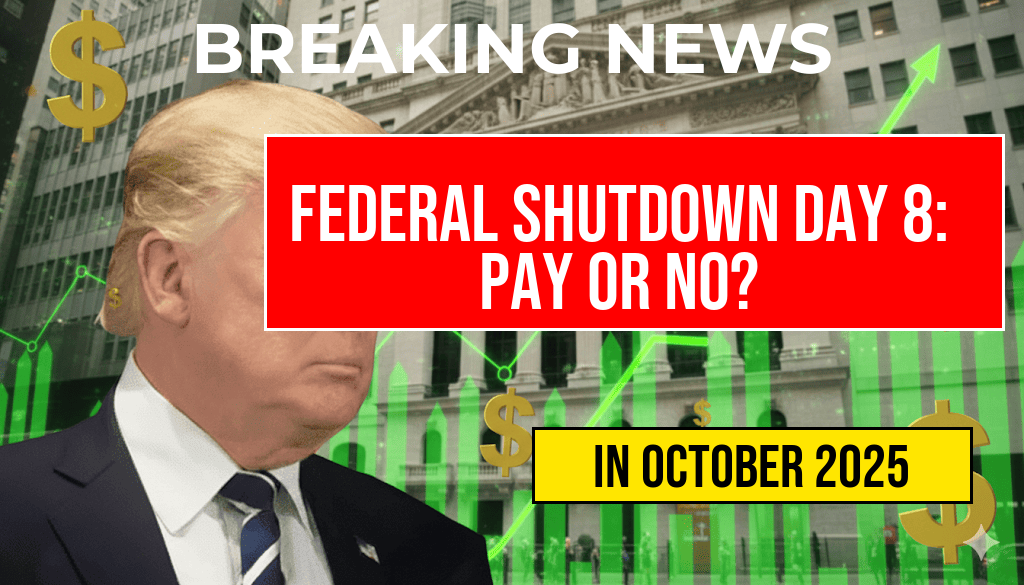As the federal government enters its eighth day of a shutdown, thousands of federal workers remain caught in limbo, uncertain whether they will receive their paychecks or face prolonged financial hardship. The impasse, driven by congressional disagreements over budget allocations and policy disputes, has halted numerous government operations. While some federal employees have been furloughed without pay, others who continue working remain in limbo, uncertain if they will be compensated for their efforts. The situation has sparked widespread concern among government workers, contractors, and their families, prompting urgent discussions about potential legislative solutions and the broader economic implications of the ongoing shutdown.
The Current State of the Federal Shutdown
As of day eight, the shutdown has affected approximately 800,000 federal employees, many of whom have been furloughed or required to work without pay. Key agencies such as the Department of Homeland Security, the State Department, and the Department of the Interior have halted many operations. Meanwhile, essential personnel continue to work in areas like border security, air traffic control, and national security, but their pay is now uncertain.
The deadlock stems from disagreements in Congress over funding for specific programs, notably immigration policies and border security measures. Despite bipartisan efforts to reach a compromise, negotiations have stalled, leaving the government unable to pass a continuing resolution or appropriations bill. The absence of a clear path forward has heightened fears over the economic fallout and the well-being of federal employees.
Will Federal Workers Receive Pay During the Shutdown?
The question of whether federal workers will receive their paychecks remains unresolved. Historically, during government shutdowns, federal employees who are furloughed do not receive paychecks until funding is restored, leading to financial strain and increased anxiety. Conversely, employees designated as essential personnel who continue working generally do receive their paychecks, but this is not guaranteed if the shutdown persists.
Legislators have introduced measures to ensure back pay for federal workers once the shutdown ends. The Congressional Budget Office (CBO) has indicated that, in past shutdowns, federal employees have been compensated retroactively. However, the uncertainty surrounding the duration of this shutdown complicates financial planning for many workers.
Impacts on Federal Workers and the Economy
Financial Strain on Employees
- Many federal employees rely on their next paycheck to meet essential expenses such as rent, groceries, and healthcare.
- Some workers have taken on additional part-time jobs or sought emergency loans to bridge the financial gap.
- Long-term shutdowns risk causing mental health issues, including stress and anxiety, among federal workers and their families.
Broader Economic Consequences
| Area | Potential Impact |
|---|---|
| Gross Domestic Product (GDP) | Reduction due to decreased government spending and consumer confidence |
| Public Services | Disruption in services such as passport processing, national parks, and research activities |
| Small Businesses | Delays in federal permits and loans affecting local economic growth |
Economists warn that if the shutdown extends beyond a week, the cumulative financial toll could intensify, with ripple effects felt across various sectors of the economy.
Legislative Efforts and Prospects for Resolution
Recent Developments
Lawmakers have engaged in intensive negotiations, with some proposing short-term funding bills aimed at reopening government agencies temporarily while broader budget issues are addressed. The Senate has considered a bipartisan measure that would provide immediate funding through a continuing resolution, but disagreements over policy riders have stalled progress.
The Biden administration has called for swift action to end the shutdown, emphasizing its impact on federal workers and national security. Republican and Democratic leaders remain at an impasse, with some members advocating for a larger budget compromise, while others push for policy concessions that have yet to be agreed upon.
Potential Outcomes
- Short-term reopening: Passing a stopgap measure to resume government operations while negotiations continue.
- Extended shutdown: If disagreements persist, the shutdown could extend further, exacerbating economic and social disruptions.
- Negotiated settlement: Reaching a comprehensive budget agreement that addresses the core issues and prevents future shutdowns.
Experts emphasize that avoiding an extended shutdown requires bipartisan cooperation, with some analysts suggesting that public pressure and economic considerations might influence lawmakers’ decisions.
Resources and Support for Federal Workers
Federal employees affected by the shutdown can access resources such as emergency financial assistance programs and support networks. Several unions and advocacy groups are urging Congress to pass legislation that guarantees back pay and provides financial relief to those impacted.
For ongoing updates, federal workers and concerned citizens can consult official sources such as the Office of Personnel Management and trusted news outlets reporting on the shutdown’s developments.
As the situation unfolds, the focus remains on reaching an agreement that restores normal operations and ensures that federal employees are fairly compensated for their service during this uncertain period.
Frequently Asked Questions
What is the current status of the federal government shutdown on Day 8?
The federal government is currently on its eighth day of the shutdown, impacting numerous agencies and services across the country.
Will federal workers receive their pay during the shutdown?
Many federal workers are uncertain whether they will receive full compensation or face No Pay during this period, as negotiations continue and the shutdown persists.
Which federal employees are affected by the shutdown?
The shutdown affects non-essential federal employees who are furloughed and essential personnel who continue to work but may face delays in pay.
How long could the shutdown last, and what are the implications?
The duration of the shutdown remains uncertain, potentially leading to ongoing disruptions in federal services and financial hardship for affected workers if it extends further.
What options do federal workers have if they do not receive their pay?
Federal workers may explore emergency financial assistance, personal loans, or other resources to manage financial obligations if they do not receive their pay during the shutdown.






